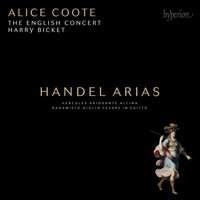Texte paru dans: / Appeared in: |
|
|
|
|
|
Reviewer: Barry
Brenesal I’ve reviewed Alice Coote twice before. Her Nerone in L’Incoronazione di Poppea (Decca 074 3339; Fanfare 33:3) was a “thoroughly believable monster of selfishness … with dramatic insight matched by a disciplined tone,” while her Prince Charming I considered one of the few bright spots in Larent Pelly’s dismally earthbound Cendrillon (Virgin Classics 2509; Fanfare 36:2): “magnificent, with a darker, well-focused mezzo, plenty of power and agility, and a good deal of edge.” These remain for me important aspects of her musical personality: a fine voice in its prime, controlled by an artist who can make it do what she wants, and whose insights aren’t only musical but theatrical as well. She creates characters. It seems perfectly sensible for Hyperion to capitalize on that, and whoever decided upon the heroes and heroines of Handel—whether producer, singer, conductor, or some amalgam of them all—the decision was a wise one. It was especially so in the case of Alcina. Coote’s Ruggiero was lost in a mind-numbingly wrongheaded 1999 Stuttgart production (Arthaus 102 300; Fanfare 37:1). Here, away from its Regietheater ways, we can at least enjoy three of her character’s arias unimpeded. There’s much to be admired in “Mi lusinga il dolce affetto,” such as the finely maintained legato line, the aristocratic phrasing, and perhaps best of all, the way Coote utilizes her lower, darker register to suggest a lover’s doubts. But of those three selections, it is “Verdi prati” that strikes me as offering the finest, most insightful singing. Ruggiero realizes he must annihilate the paradise magically created by the sorceress Alcina, yet he can’t help reflecting with exquisite tenderness on the beauty of all he must destroy. The expressive tone of the piece is lingering regret: nothing more, nothing less. Coote achieves this through phrasing, vocal coloration, and varying dynamics. The first statement of the aria’s main theme (and its immediate restatement) is treated simply, with relative strength; the second time through, it gains lightly caressing ornamentation, as though Ruggiero were limning the trail of a vine, the shape of delicately curled petal. By the third and final time around, Coote moves into an ever so slightly slower restatement of the theme following the last line of the aria—that only ugliness will remain of all this beauty—without taking an extra breath. At several points the line is gently slurred, and the brief coda, with its soft, immaculate trill, is a poignant farewell offered up to a false Eden. “Dopo notte” from Ariodante offers the most convincing display on this album of a skyrocket number, with its moderate tempo (Bicket truly sympathetic throughout in his accompaniment) allowing for greater sensitivity to phrasing than is the case in many recordings of an aria di trionfo. Its confident tread also possesses a cumulative effect that shows it isn’t necessary to rush such pieces. Richard
Wigmore’s liner notes catch the point precisely when he says of the vocal
line in Ariodante’s “Scherza infida!” that it “seems to expand infinitely.”
It’s a fit note upon which to conclude this review, and, one momentary loss
of tonal focus aside, as distinguished a piece of singing as I’ve heard from
any artist singing Handel on record. Play it, or “Verdi prati,” “Cara speme,
questo core,” or “There in myrtle shades reclined” to those who lament to
you that The Golden Age of Opera Singing is dead; and if they persist,
escort them out of your home so that you can listen to this album in full
once more. It’s as good an excuse as any to enjoy yet again a fine artist in
magnificent music. | |
|
|
|
|
|
|
|
Cliquez l'un ou l'autre
bouton pour découvrir bien d'autres critiques de CD |
|




